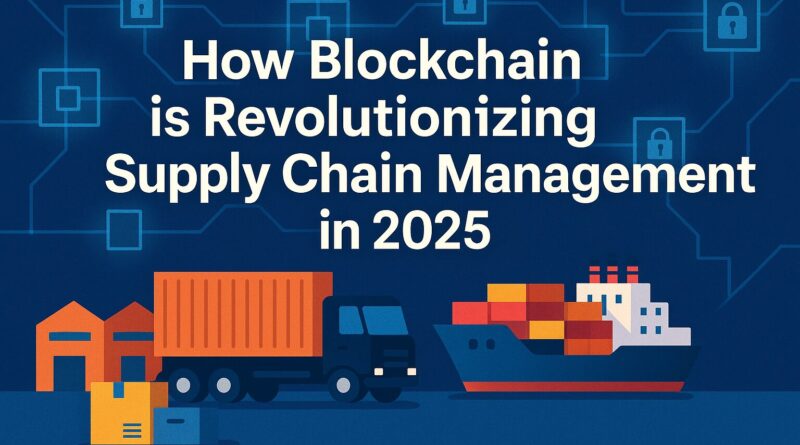How Blockchain is Revolutionizing Supply Chain Management in 2025
In 2025, blockchain technology is no longer a buzzword—it’s a game-changer in industries like supply chain management. As global supply chains grow more complex, businesses face mounting challenges with transparency, traceability, and trust. Blockchain is revolutionizing supply chain management in 2025 by offering decentralized, immutable, and real-time data-sharing capabilities that simplify logistics and boost efficiency.
What Is Blockchain Technology?
Blockchain is a decentralized, distributed digital ledger that records transactions across a network of computers. Each transaction is stored in a block and linked chronologically, making the data immutable and verifiable. In the context of supply chain management, blockchain enables all parties—from manufacturers to retailers—to access a single source of truth in real-time.
Current Challenges in Supply Chain Management
Traditional supply chains often suffer from:
- Lack of transparency
- Poor traceability
- Data silos across stakeholders
- Counterfeit goods and fraud
- Time-consuming manual documentation
These inefficiencies result in lost revenue, compliance issues, and reputational damage.
How Blockchain Solves These Problems
Blockchain is revolutionizing supply chain management in 2025 by addressing these challenges head-on:
- Enhanced Transparency: Each transaction is visible to all participants in the network, ensuring clarity across the chain.
- Real-Time Tracking: From production to delivery, blockchain enables end-to-end visibility.
- Fraud Prevention: With data integrity and timestamped transactions, blockchain reduces counterfeiting and double spending.
- Smart Contracts: Automate processes like payments and order verification based on predefined rules.
These features make blockchain an ideal solution for the modern-day supply chain ecosystem.
Key Benefits of Blockchain in Supply Chains
Improved Traceability
Products can be tracked at every stage of their journey. In the event of a recall, companies can quickly identify affected batches, ensuring safety and compliance.
Cost Reduction
Blockchain reduces the need for intermediaries and minimizes manual paperwork, lowering overall operational costs.
Trust and Accountability
Every participant in the blockchain is accountable for their actions. This builds a culture of trust between suppliers, distributors, and customers.
Better Compliance
Industries like pharmaceuticals and food require strict regulatory compliance. Blockchain simplifies audit trails and makes compliance transparent and verifiable.
Real-World Use Cases in 2025
🔹 Walmart’s Food Supply Chain
Walmart uses blockchain to track the origin of food items. What used to take 7 days to trace now takes just 2.2 seconds, ensuring faster responses to contamination issues.
🔹 Maersk’s TradeLens Platform
Shipping giant Maersk uses blockchain to digitize paperwork and streamline cargo movement. This has significantly reduced processing times and fraud.
🔹 IBM Food Trust
IBM’s blockchain platform helps food suppliers and retailers improve transparency and reduce waste in the food supply chain.
Future Outlook and Predictions
By 2025, over 60% of global supply chain leaders are expected to integrate blockchain into their core systems. Blockchain is merging with IoT and AI to offer:
- Predictive supply chain analytics
- Automated replenishment
- Intelligent risk mitigation
As governments embrace digital transformation, blockchain adoption will be further accelerated by regulatory frameworks, especially in developing countries.
Final Thoughts
How blockchain is revolutionizing supply chain management in 2025 is not a futuristic prediction—it’s today’s reality. Companies embracing blockchain are gaining a competitive edge through efficiency, trust, and transparency. As the technology continues to mature, expect to see blockchain-powered supply chains becoming the global standard.
Want to Dive into Other Trending Tech Topics in 2025?
Explore more of our expert-written guides and insights:
- How Blockchain is Revolutionizing Supply Chain Management in 2025 – Understand the game-changing role of blockchain in logistics.
- How to Create a Smart Contract on Ethereum: Step-by-Step Guide – A beginner-friendly tutorial to launch your first smart contract.
- GitHub Actions vs. Jenkins for Beginners: What to Use in 2025? – Discover which CI/CD tool is right for your next project.
Helpful Resources to Explore Further
IBM Blockchain – Supply Chain Solutions – https://www.ibm.com/blockchain/solutions/supply-chain
Harvard Business Review – Global Supply Chains and Blockchain – https://hbr.org/2022/05/global-supply-chains-are-about-to-get-better-thanks-to-blockchain

